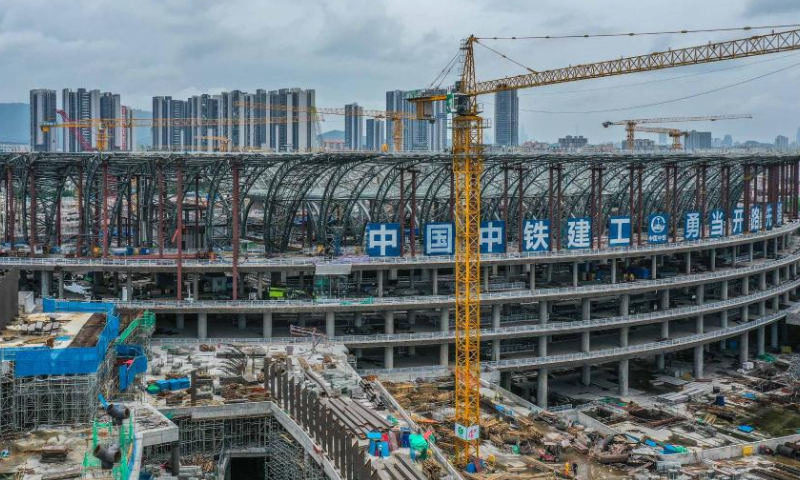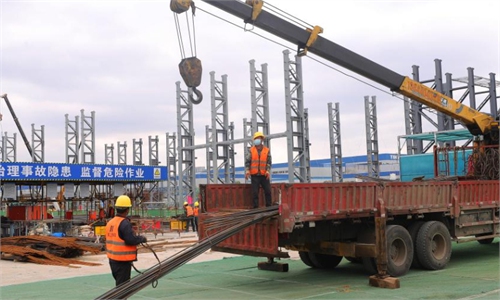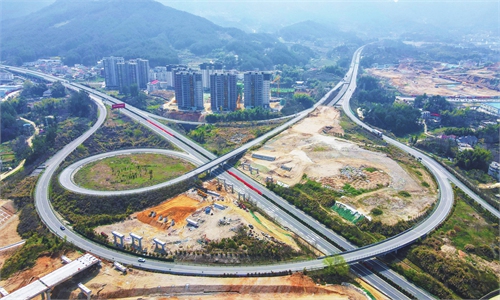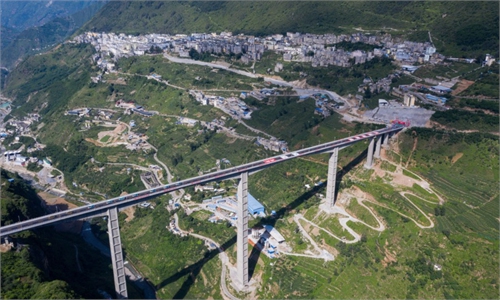Key projects in full swing across China, set to boost economic recovery
Investment to keep fast growth, boost economic recovery: expert

Aerial photo taken on Aug. 4, 2022 shows the construction site of Guangzhou Baiyun Railway Station in Guangzhou, south China's Guangdong Province. The main structure in phase one of the construction has been accomplished. (Xinhua)
Major infrastructure projects across China are being carried out in full swing during what's known as "Golden September, Silver October," usually a high point for the construction sector, as the country is boosting infrastructure investment as part of a broad effort to stabilize the economy.
Thanks to policy initiatives that place much emphasis on the role of infrastructure expansion on economic growth, investment in infrastructure is expected to maintain high-speed growth of about 10 percent this year and help boost economic recovery, an economist said on Tuesday.
Pointing to the infrastructure boom, five of China's top state-owned construction firms, including China State Construction Engineering Corp (CSCEC), China Communications Construction Co and China Railway Construction Corp, saw their new infrastructure contracts hit 3.9 trillion yuan ($563.1 billion) in the first half of the year, up 26.4 year-on-year, the China Securities Journal reported, citing Guosheng Securities.
China Railway Construction Corp told the Global Times on Tuesday that it aims to scientifically and rationally carry out construction, with breakthroughs in a batch of key projects.
Closure has been completed on the Jinhai Avenue Bridge, China's first multi-tower road-rail cable bridge, according to the group. The Jiuwandashan No.4 tunnel in Huanjiang Maonan Autonomous County, South China's Guangxi Zhuang Autonomous Region, was drilled through in August, marking the completion of all 108 tunnels of the Guiyang-Nanning high-speed railway line, it said.
Stated-owned construction giant CSCEC said in a statement sent to the Global Times on Tuesday that the company aims to align its operations with the macroeconomic environment to keep a fast pace of rolling out projects.
The group has ramped up its ability to study the central government's support policies and grasp related opportunities, and its local branches closely follow up on opportunities stemming from central government budget investment and projects supported by special-purpose local government bonds.
CSCEC said it has been improving in-house efficiency in pushing a project down the approval pipeline in a faster manner.
The share of housing projects dropped in its total contracted value by 12.3 percentage points in the first half of 2022, but the share of industrial complex projects rose by 5.1 percentage points, and that of commercial office buildings by 0.8 percentage points, according to the statement.
Localities such as Hangzhou in East China's Zhejiang Province, Tangshan in North China's Hebei Province and Haikou in South China's Hainan Province have launched key projects to seize the opportunity of the peak season for the construction sector.
On Friday, Haikou held a launch ceremony for a third batch of 30 key projects covering sectors including infrastructure, public services and environmental protection, with total investment of 17.4 billion yuan, according to the local government website.
The remarkable progress in the country's key infrastructure projects comes as the authorities channel more financial support into the sector amid national efforts to catalyze domestic demand and sustain an economic recovery.
China's investment in water infrastructure through a mix of bank loans and social capital this year has reached a record high of 238.8 billion yuan, with 19,000 new projects in progress, the Ministry of Water Resources told a press conference on Tuesday.
To speed up the construction of key projects, the quota of "policy-backed and development-oriented financial instruments" will be increased in accordance with local demand, and projects where construction started in the first half of the year will also obtain support, according to a State Council meeting on Thursday.
The instruments are designed to grant financial support for key projects by playing a greater guiding role, without resorting to massive stimulus or excessive money supply, according to the meeting.
Earlier this month, the quota for the tools was expanded by another 300 billion yuan to better fund major infrastructure projects. Prior to this, a total of 300 billion yuan had already been allocated via such instruments, covering more than 900 projects, according to the People's Bank of China, the central bank.
Thanks to these multi-pronged efforts, investment in infrastructure gained 7.4 percent year-on-year in the first seven months of the year, according to data from the National Bureau of Statistics.
With policy incentives and accelerated construction of key infrastructure projects across the country, the growth rate of infrastructure investment is expected to further accelerate to 10 percent or higher in the second half of the year, Cao Heping, an economist at Peking University, told the Global Times on Tuesday.
While taking advantage of favorable policies to accelerate the construction of key projects, domestic enterprises should also expand new infrastructure such as 5G and smart cities to play a larger role in promoting technological transformation and contributing to the stable recovery of the economy, said Cao.



